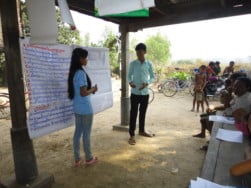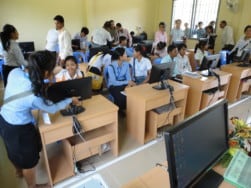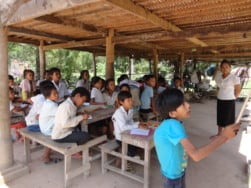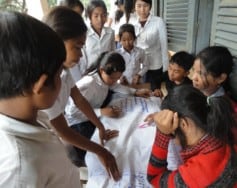Transforming Education for Youth in Cambodia
December 5th, 2022 | Blogs
With two-thirds of its population being under the age of thirty, Cambodia’s youth represent its greatest asset and force for change. At the same time, however, Cambodia’s young people face the devastating effects of the pandemic, economic recession, climate change, biodiversity loss and environmental degradation, and what is widely known as a ‘democratic recession’.
In education, despite many improvements, only 45% of young people remain in school by the time they reach 17 years old. There remains concern about poor educational quality, high numbers of youth leaving school without foundational knowledge and a broadly recognized ‘skills gap’. In surveys, employers continue to identify a lack of basic skills such as critical thinking and proper work attitudes among those who did complete school.
Concerted efforts to adapt education, training, and workforce development are crucial for ensuring that the full, diverse spectrum of Cambodia’s young people gain not just knowledge, but the values, skills, attitudes, and agency to transform themselves and the wider society around them.

World Education has decades of experience working with young people, their families, educators, and communities in Cambodia. We have been working alongside the Ministry of Education, Youth and Sport and local organizations to increase educational access and help Cambodia’s youth – including migrants, ethnic and religious minorities, indigenous populations, and young women – improve learning outcomes, job readiness and civic engagement. We emphasize age-appropriate, relevant, inclusive, and action-oriented pedagogies that prepare young people for the rapidly changing workforce and also foster responsibility for the future. From leadership training, peer-learning, and student council formation to project-based learning, youth-led community outreach and action research, we strive to model transformative education and positive youth development at its best.
World Education’s Youth on the Move project revitalized student councils and clubs that organized a range of enriched learning activities and leadership opportunities, campaigns and community actions, and provided peer education in Information and Communications Technology skills, safe migration, financial literacy, and entrepreneurship.
Under the global youth program ConnectEd, we connected disadvantaged youth to civil society and the wider world and emphasized their role as catalysts for change. Overall, 5,000 youth got involved in their communities in new ways – volunteering to help elders, leading campaigns, calling meetings, using art, theater, video, photos and social media to express their values, ideas, concerns and dreams.

The Basic Education Equivalency Program addressed the issue of high dropout rates in secondary education by developing an mLearning alternative education pathway. This enables Cambodian out-of-school youth to attain a high school equivalency credential through a self-paced, flexible learning modality while continuing their work.
World Education has led the way in early efforts to promote digital skills in schools, design mLearning tools, use technology to increase access to information, and develop educational management digital tools. Our approach is built around the widely endorsed Principles for Digital Development and emphasizes human-centered design, designing for scale and sustainability, and addressing privacy and security.

Access to and skill development in information communication technology for both teachers and youth played a prominent role in our ConnectEd and Youth on the Move projects’ efforts to reduce barriers that typically prevent youth from receiving adequate preparation for the world of work. Whether being taught how to create class videos on YouTube, use cameras and presentation software to show photos of issues in their communities during public forums, or how to post to Facebook – the technology and social media tools taught by World Education provided youth with the skills and resources to safely access information, create content and network with others.
By bolstering the capacity of ministry officials, local youth-led and youth-serving organizations, administrators, teachers, non-formal education facilitators, and community leaders, World Education strengthens the formal and nonformal youth education system at the national, regional, and district levels. Our inputs include the development of curricula, teacher and trainer professional development and policy reform that emphasize the role of schools and communities as the bedrock for youth development, particularly for providing the foundation of soft skills and asset building.

Elsewhere across the world, World Education’s work has demonstrated that when given the right technologies, resources, skills, and space, youth can begin to break the cycle of exclusion and disadvantage many of them face. Our programming meets youth’s holistic needs by increasing their knowledge, assets, and skills; enhancing protective factors; improving access to services; and encouraging participation in economic, social, and political life.
Our youth programs around the world encompass:
World Education fosters enduring partnerships across regions and sectors to advance education outcomes for all. We offer education systems strengthening, program design and implementation, applied research and evaluation, capacity development, and policy development services.